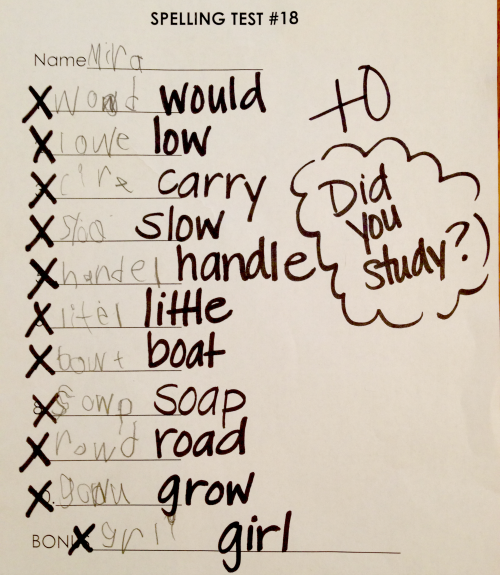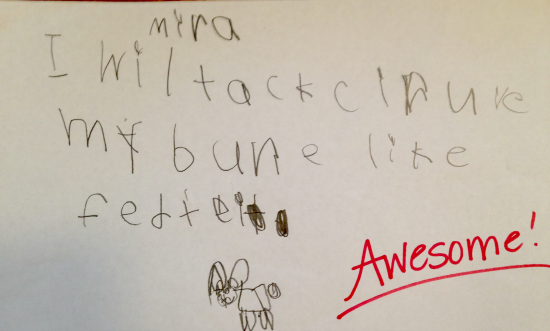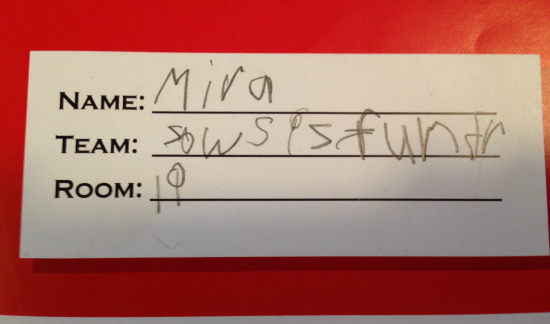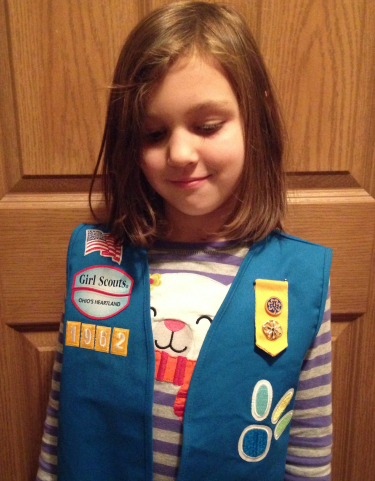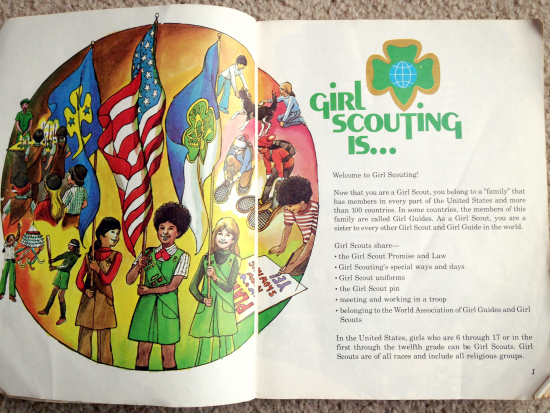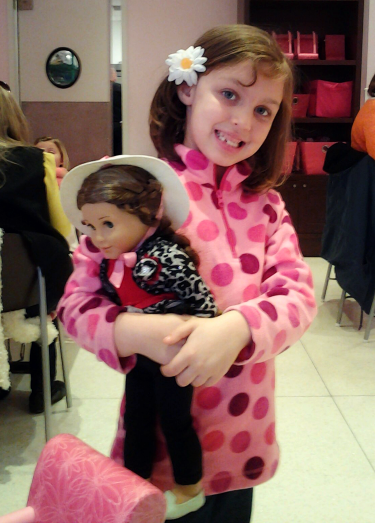Last week, I took Cordy and Mira to their first optometrist appointments. I know, I should have scheduled eye appointments long before now. But Cordy has only recently reached a point where she doesn’t have a panic attack in any kind of doctor’s office, and all of the tools used to look at eyes would have freaked her out in the past. The school nurse does a brief eye exam every year, and both kids have brought home 20/20 vision reports with no indications for referrals.
So, I waited until now. Partially my own procrastination, partially wanting to shield my child from more scary things as a special needs parent. After all, Cordy reads ALL the time – if she had vision problems, wouldn’t she have complained about her eyes hurting? But I have noticed recently that one of her eyes was turning out occasionally. It’s happened since she was three or four, but back then it was a very rare thing, and her doctor said it was common when little kids are very tired. (Which is primarily when we noticed it.) Now, though, I’ve been seeing that eye turn out more and more, not tracking in sync with the other eye.
The hardest part in getting ready for the appointment was convincing Cordy that an eye doctor doesn’t have any shots to give. Because apparently doctor = shots. I went through the whole process with both girls, explaining what they’d do and what they’d see in the office.
Cordy was called back first, and I went with her. The initial tests that involved looking into a machine and clicking buttons when she saw dots of light was a little frightening to her at first, but I convinced her it was a game and then she loved it and asked if she could have a second try to improve her score. Then she was taken into the exam room, where the digital eye chart was displayed and she was asked to read the smallest line she could comfortably read. She found this “test” easy and rattled off the bottom line, a line so small I had to work to read it sitting only a third of the distance away.
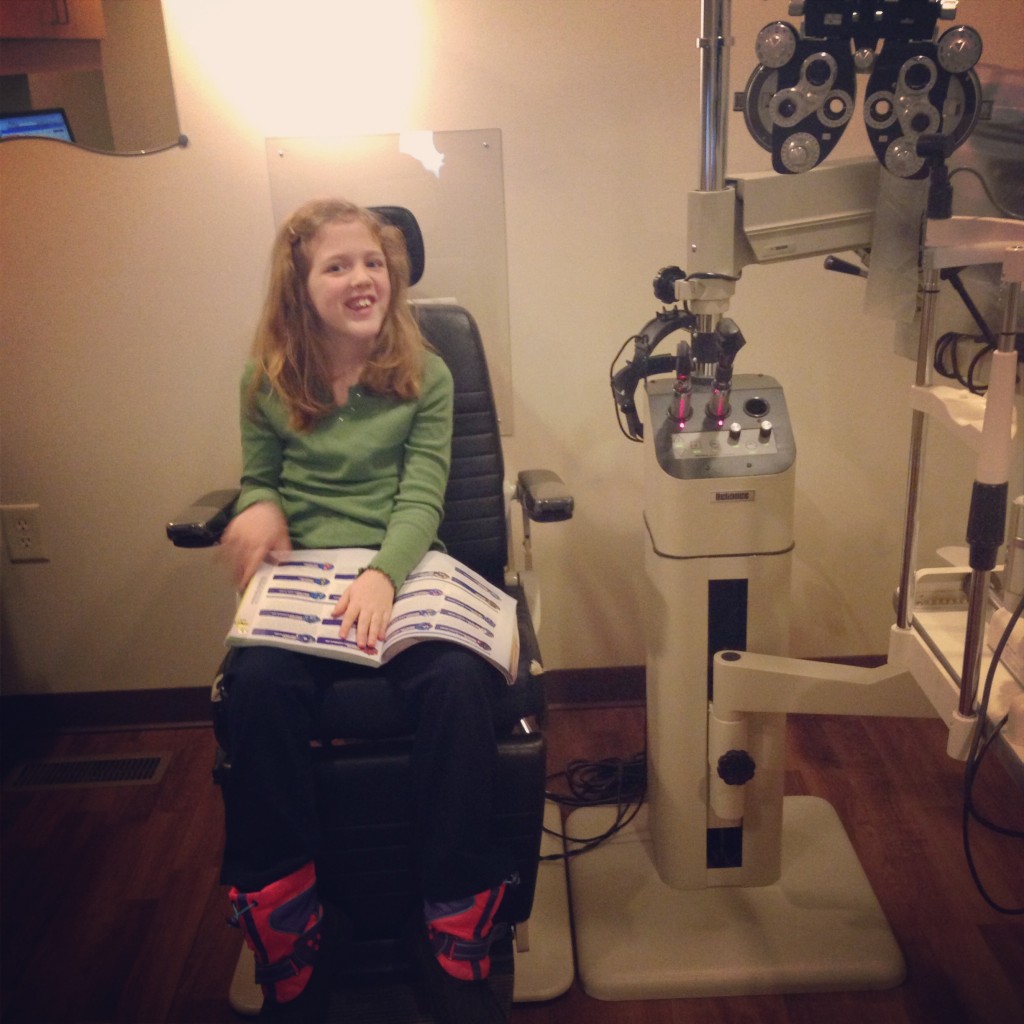 Yes, she brought a book to read while at the optometrist.
Yes, she brought a book to read while at the optometrist.
But then she was asked to cover up one eye and read it again. She covered the left and rattled off the letters on the chart again. Switching to cover her right eye, though, she paused. She then tried to cheat and partially uncover the right eye. The assistant asked her to totally cover the right eye, no peeking, and read the smallest line she could. Cordy squirmed and leaned forward, again briefly uncovering her right eye. That was enough time for her to memorize the line and repeat it back. (Sneaky kid.)
I called her on it that time, though, and asked that she try again with a different chart she hadn’t memorized. The assistant helped hold the eye cover in place to prevent cheating again. Cordy frowned, squinting and shifting around while staring at the eye chart. She then said, “It’s all fuzzy. I can’t see the letters.” We encouraged her to not worry about the smallest line and read whichever line she could. She tried reading the top line, and missed two of the five letters.
Hmmm…that’s a problem. So much for the school nurse’s 20/20 in each eye report.
The optometrist spent a good deal of time looking at Cordy’s eyes, confirming that she can tell there’s a bit of outward drift with her left eye. She also confirmed that Cordy can’t read much of anything from that eye. Her right eye is 20/20, and she believes her left eye was likely equal to her right until very recently, probably a year or two at most since it changed. How she was able to determine that her vision change was a recent development is beyond my knowledge, but I trust she knows what she’s talking about.
The treatment plan first calls for glasses, so Cordy can actually use her left eye for reading. At the moment, her right eye is doing all of the work, so it’s time to make the left eye do a share of it, too. After a few weeks of getting used to glasses, she’ll then see a pediatric specialist for the muscle issue. It’s likely she’ll need special treatment (probably wearing an eye patch for a period of time each day) to strengthen the muscles of her left eye to keep it from drifting.
Cordy’s reaction to needing glasses bordered on a meltdown. She yelled that she didn’t want glasses and wouldn’t wear them, because everyone would think she was a nerd. The optometrist explained that lots of kids wear glasses, and I reminded her that her parents wear glasses sometimes, too. “It’s OK for adults to wear glasses, but I’ll be a nerd and teased,” she cried. As for her friends who wear glasses? “They’re already cool, so they’re able to wear them without being nerds.”
The doctor made it very clear to both of us: she has to wear glasses, or her left eye will only get worse, leading to developing a lazy eye, and possibly losing any use of it. Well then, she’d going to wear those glasses, even if I have to use every method possible to convince her to do it.
I took Cordy out to the waiting room so we could look over the selection of frames while Mira had her eyes examined. I hoped that by giving Cordy some control in choosing her frames, she’d be a little happier about the process. She wasn’t. She tried on pair after pair and declared each to be “not that cool” and fell back on her fears of being a nerd. With every pair, she sniffed and frowned and grumbled that she didn’t want glasses.
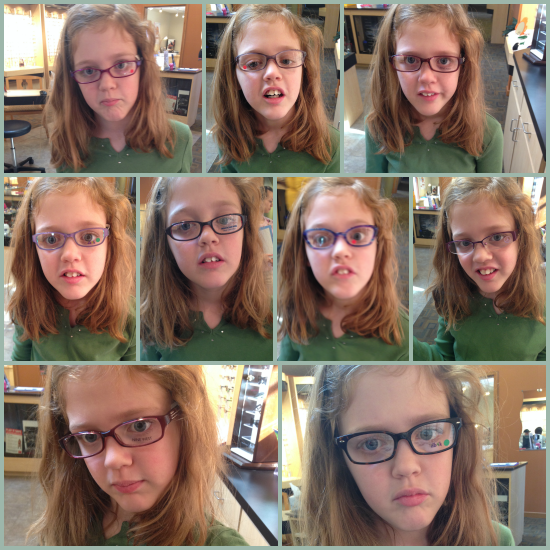 Some of the pairs we tried on. She wanted me to take a photo of each so she could see what they looked like on her.
Some of the pairs we tried on. She wanted me to take a photo of each so she could see what they looked like on her.
We didn’t find any pair that she was happy with, but there was a pair I thought looked best on her. I tried to convince her that they were the best choice. “They’re not blue,” she replied. “I don’t want anything that isn’t blue.” The assistant quickly whisked the frames away to check them in their computer, and returned to tell me they also came in blue. Bingo.
The assistant sat Cordy down to measure her pupil distance to place the order for her glasses. Cordy again began to cry that she didn’t want glasses. At the same time, Mira came bouncing out of the exam room, announcing that her eyes were healthy. The optometrist was right behind her, confirming that everything looked good.
“So can I pick out glasses now, too?” Mira asked. Unlike Cordy, she was excited about getting glasses, because to her they’re a fashion accessory.
The doctor laughed and then said, “No, honey, you don’t need glasses. Your eyes can see perfectly!”
And then Mira cried. Big tears rolling down her cheeks over being denied glasses.
I stood there, with Cordy on my right, crying that she had to get glasses, and Mira on my left, crying because she couldn’t get glasses. The assistant looked up at me. I sighed and said, “I give up. I can’t make anyone happy today.”
So Cordy will be getting glasses soon, which will hopefully make it easier for her to read and will start the process of strengthening her left eye. The kid reads for hours and hours a day, so I’m amazed she wasn’t complaining of eye strain with one eye doing most of the work.
As for Mira? I caved and took her to Claire’s. She now has a flashy pair of fake glasses:
And she’s already forgotten them at school for most of this week.

